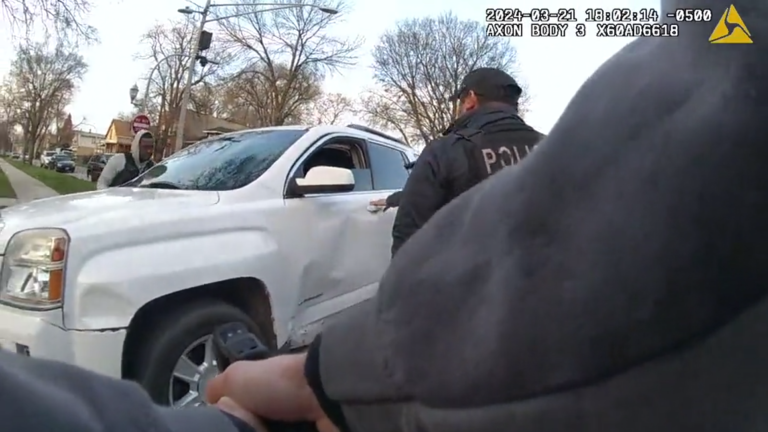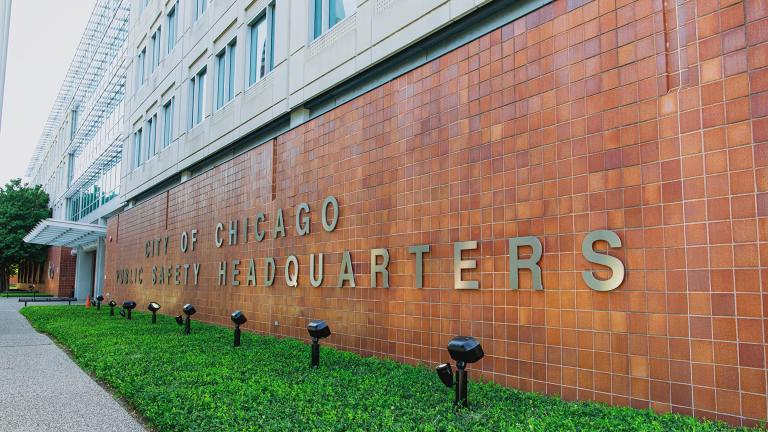 (WTTW News)
(WTTW News)
Chicago taxpayers spent at least $74 million to resolve lawsuits alleging Chicago police officers committed a wide range of misconduct — including false arrest and excessive force — in 2023, according to an analysis of city data by WTTW News.
That number is significantly less than the totals in 2022 and 2021, when taxpayers spent an average of $95 million in each year to resolve more than 120 lawsuits alleging police misconduct, but on par with what the city has spent to resolve police misconduct lawsuits on average during the past four years, according to WTTW News’ analysis of reports released by the Chicago Department of Law.
Dating back to 2011, the first election after the retirement of former Mayor Richard M. Daley, who was in office for 22 years, the financial toll of police misconduct has dropped precipitously during mayoral election years, and 2023 was no exception.
In 2023, city officials resolved at least 120 lawsuits alleging police misconduct, according to WTTW News’ data analysis. The largest payment for a single incident — a combined $25 million — went to two men who spent a combined 34 years in prison before being exonerated of killing a basketball star in 1993.
Wrongful convictions have long been the most expensive kind of police misconduct in Chicago, costing taxpayers a total of $182.3 million since 2019, and $29.25 million in 2024 alone, or nearly 40% of the total amount spent to resolve allegations of police misconduct, according to the analysis.
WTTW News’ analysis of settlements and verdicts reached in 2023 included all cases identified by the Chicago Law Department as caused by some form of police misconduct, including false arrest, excessive force, extended detention, malicious prosecution and illegal search or seizure that resulted in a jury verdict against the city or that the Chicago City Council agreed to resolve with a payment.
It does not include cases involving motor vehicle collisions other than crashes caused by pursuits launched by officers.
WTTW News’ analysis also includes $11.3 million in settlements approved by the City Council in December 2023 that had not yet been paid by the city.
The cost of resolving police misconduct lawsuits has become a frequent source of political heartburn for members of the Chicago City Council, who are divided along ideological lines about the cause of the escalating costs. The City Council must ratify all settlements of more than $100,000.
Conservative alderpeople say the city’s lawyers and their colleagues are too eager to settle cases before trial. According to the alderpeople, that encourages those guilty of criminal wrongdoing to sue the city in the hopes of an easy payday.
However, progressive members of the City Council see the expense as perhaps the most visible cost of the fact that city officials have yet to put an end to the decades of scandals, misconduct and brutality that have engulfed the Chicago Police Department.
Mayor Brandon Johnson has said he is committed to ensuring that the Chicago Police Department “engaged in constitutional policing.” Only when that becomes the “prevailing force” in Chicago, the mayor said, will the city be able to rein in the cost of police misconduct lawsuits.
Six major efforts to change the way CPD operates have failed, and city officials have yet to comply with court-ordered reforms prompted by a 2017 federal investigation that found officers routinely violated the civil rights of Black and Latino Chicagoans.
That consent decree took effect five years ago this month, and the city has fully complied with just 6% of its requirements.
Inspector General Deborah Witzburg has repeatedly sounded the alarm about the escalating costs of police misconduct, releasing an audit that found the city does not collect enough data to “effectively manage the risk of expense to the city and harm to its residents arising out of CPD’s operations.”
That lack of detail means city officials rarely link settlements or verdicts — which can run into the millions of dollars — to specific complaints of misconduct, and do not analyze what led up to the incident in an effort to prevent similar cases by disciplining officers, retraining them or offering them counseling or other treatment, Witzburg said.
In 2017, the Department of Justice urged city officials to “review settlements and judgments on a broader scale to spot for trends, identify officers most frequently sued, and determine ways to reduce both the cost of the cases and the underlying officer misconduct.”
There is no evidence city officials heeded that warning at any point in the seven years since the Obama Department of Justice released its probe of CPD triggered by the police murder of 17-year-old Laquan McDonald in October 2014.
Contact Heather Cherone: @HeatherCherone | (773) 569-1863 | [email protected]








